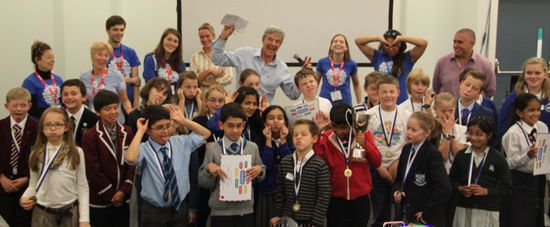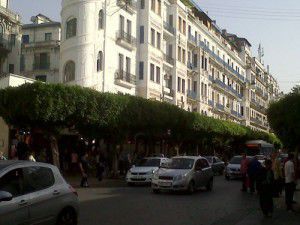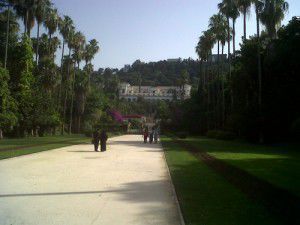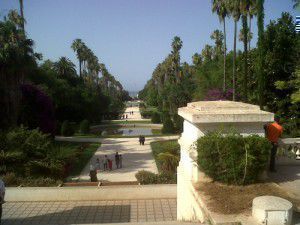Junior Language Challenge 2014 – the final!
On Friday 17th October, 31 young linguists from all over the country came to London for the final of our national competition for primary schools, the Junior Language Challenge. Since March, they’d learnt Italian for the first round, Japanese for the semi-finals and they’d spent the last few weeks studying the African language of Somali in preparation for the final.
As the final got underway, one thing became very clear – it was going to be close! We started with three tense heats, from which only the top 12 overall would gain a place in the final round. After a break for lunch (and a spot of African drumming to let out the tension), the top 12 returned to the iPads for the final showdown…
Congratulations to our champion, Yash Suribhatla, who put in an amazing performance to win the top prize of a family trip to Malawi. While he’s there, Yash will have the opportunity to see the work being done by our charity onebillion. Well done also to our runners-up, Nathan Govender from Surrey and Shane Bowden from London.
But we don’t want anyone to feel disappointed – with over 1,100 children registering for the JLC back in March, to reach the top 31 in the country is an absolutely amazing achievement and one we hope all our finalists will be very proud of. So we’d like also to say a huge congratulations to all our superstars, not only Yash, Nathan and Shane but also Christian, Nicole, Olivier, Edward, Christopher, Maciej, Rosie, Grace, Tara, Nithya, Aalaya, Matthew E, Isobel E, Matthew W, Tudor, Aryam, Georgia, Ben, Gregor, Cara, Eleanor, Isobel P, Jennifer, Sharvari, Harry, Saarah, Maryam and Theo!
See more photos from the JLC final.
And finally, a few words from our champion 🙂
Hello, my name is Yash Suribhatla and I attend Fairfield Preparatory School in Loughborough. I won the EuroTalk JLC final, 2014. This once in a life-time experience really interested me in learning new languages and I would describe it as one of the best learning opportunities I have ever had, which will remain with me for the rest of my life. I was glad to see all my hard work, trials and tribulations and occasional tears pay off in the very end. Realising that I had won was mind-blowing. What made it even more special was that I had never won such a big trophy in my life!
I felt so frightened as I entered my name at the start of the grand final. Going behind on points in the first three rounds, made me determined to fight back in the next few rounds. Luckily, I managed to pull it off and maintain my lead until the end. I was truly speechless when I won and managed to smile at my teacher, who smiled back in delight.
Well done, Yash!
If you’d like to know more about the Junior Language Challenge and how to take part in 2015, you can sign up to our mailing list on the JLC website, where there’s also more information on what the competition is all about. Or you can email us with any questions.
10 reasons to visit… Algiers
I must admit that Algeria does not feature highly among people’s bucket list destinations.
While most tourists visiting the region flock to Egypt or Tunisia, Algeria is still very much off the beaten track. Nor does it help that it has attracted a rather bad press over the last year or so: much of the country is a security risk and the FCO advises against all travel to half of the Algeria, and all but essential travel to much of the rest.
Chickened out? Well, there is always its next door neighbour Morocco, which admittedly has done much to develop its tourist industry over the years.
‘Ah but I’ve been there already’, you say, ‘I’ve stayed in a posh riad, I’ve had a ride on a camel and I’ve stocked up on more of those pointy slippers than I’ll ever need.’
Quite. So you’re looking for the real deal, are you? Well, the good news is that Algiers, the capital, is very much worth the detour, untouched by Easyjet, and better still, firmly in the ‘OK to visit, but be careful’ bit of the country. I was lucky enough to go twice, and here I am writing this: all bodily parts present and correct, wallet intact, and dignity unscathed.
As it happens, I was working on a project with one of the government ministries. This meant that I was fortunate enough to be met at the airport and whisked through immigration and customs in seconds. I also benefited from a security detail which picked me up and accompanied me wherever I went: a pair of friendly enough goons, wearing shades and Blues Brothers suits (sans hats), constantly tailing us in a slightly scruffy VW Polo – not a Bluesmobile.
So here are my ten reasons to visit Algiers (and a bit of the surrounding area):
1. The city centre
Algiers has a faded, run down beauty. The centre of the city is full of white stuccoed buildings in the French colonial style and you’ll love exploring the up-and-down streets and avenues. Pack a pair of stout walking shoes though, as it’s a hilly place. And as you take a break, sipping a coffee and people watching at one of the many excellent cafes dotted around town, you may be wondering where all the tourists have gone. Don’t worry: the last ones left circa 1962, so you really will have the place to yourself.
2. The view
You may find yourself in accommodation higher up and somewhat away from the city centre, with the city stretching out below you. Not for nothing is the city called ‘Alger la Blanche’.
3. Public transport
I found a little cable car that takes you down the hill (i.e. from the residential suburbs to the city centre) to the sea and Botanic Garden in just three minutes. There’s also a one-line metro that crosses the city, which, when I used it, was virtually empty. I wondered whether people had in fact been told it had recently opened – or maybe they simply refused to pay the 15p fare.
4. Cheap fuel
Petrol in Algiers costs only around 10p per litre. No, this is not a misprint for 110p. Algeria is, after all, still one of the world’s leading oil producers.
5. No retail chains
Should you require a fix from KFC, McDonalds, Zara, or any other global retailer for that matter, please leave Algiers immediately. To remind you, this is not Morocco. However, with your 4 X 4 filled up with 10p petrol you could probably drive there.
6. The food
If you enjoy your French food, you might like Algiers’ version of it. The seafood is excellent, especially when washed down with a glass of Oran wine, which is not bad at all. Alternatively, if you enjoy your coucous you’ll love the Algerian varieties. Do not expect Michelin star joints: most eateries are small and family run.
By the way, you will need to hone either your French or Arabic speaking skills when you negotiate your way around town, as very few people speak English. I strongly suggest a purchase of uTalk prior to departure.
7. The treats
Do you have a sweet tooth? There are countless well stocked patisseries wherever you look, with everything from tiny sugar dusted and intricately decorated almondy cakes to classic croissants on display.
8. Le Jardin d’Essais du Hamma
The botanical garden, Le Jardin d’Essais du Hamma, is lovely: classically designed, it is formal, tropical and a respite from the heat, especially if you’re visiting during the summer.
9. Tipasa
One day we were taken along the coast to the sleepy little seaside town of Tipasa, which goes back 2,000 years, and where it is possible to visit the remains of the Roman city. In fact Tipasa became one of the most important ports in Ancient Rome.
10. Notre Dame d’Afrique
If you are determined to venture high enough in the city you’ll find Notre Dame d’Afrique, a 19th century Catholic church, which is an official monument and commands views of the Bay of Algiers and the harbour. Its architecture is fascinating: a successful blend of Eastern and Western influences.
I can’t end my snapshot of Algiers without a quote from one of its best known sons. In his 1936 essay, ‘A Summer in Algiers,’ Albert Camus wrote: ‘In Algiers one loves the ordinary places: the sea at the end of every street, a certain volume of sunlight…’ What more can you ask for?
Steve
Quote of the week: 25 Oct 2014
“When you find people who not only tolerate your quirks but celebrate them with glad cries of ‘me too!’ be sure to cherish them. Because those weirdos are your tribe.”
Embed This Image On Your Site (copy code below):
Why learn Chinese Chengyu?
Today’s guest post is by Joe Paterson, a student at Keats School in China. Joe explains Chinese chengyu, which are absolutely fascinating and a perfect example of why we love languages so much – they’re all so unique and interesting. Do any Chinese speakers have more examples – or does the language you’re learning have an equivalent?
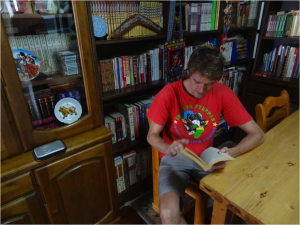 Each language has its own idiomatic richness. English is full of proverbs, sayings and odd phrases like ‘Bob’s yer uncle’. Chinese is no exception. When you learn Chinese in China, you will definitely come across all kinds of interesting and creative ways of saying and expressing things. 土包子 (tubaozi/earth steamed-bun) means a country bumpkin or someone with backward or poor taste, and to wear 绿帽子 (lv maozi/ green cap) means to be cuckolded. But perhaps the most uniquely Chinese idioms are 成语 (chengyu).
Each language has its own idiomatic richness. English is full of proverbs, sayings and odd phrases like ‘Bob’s yer uncle’. Chinese is no exception. When you learn Chinese in China, you will definitely come across all kinds of interesting and creative ways of saying and expressing things. 土包子 (tubaozi/earth steamed-bun) means a country bumpkin or someone with backward or poor taste, and to wear 绿帽子 (lv maozi/ green cap) means to be cuckolded. But perhaps the most uniquely Chinese idioms are 成语 (chengyu).
Chengyu are four character phrases that can be thrown into daily conversation but will throw up a wealth of meaning and significance to the interlocutor. Some of these phrases seem quite bizarre without a context, but many have a background story which explains the meaning and also conjures up images that reinforce the word’s meaning.
The first chengyu we will look at is 东施效颦 (Dongshixiaopin/ Dong Shi effect frown). The literal translation is altogether puzzling but a native speaker would instantly know the meaning to be to imitate someone but have the opposite to the desired effect. It is only when we know the background story to the saying that we can fully comprehend it. The story goes that there was a beautiful girl named Xi Shi in the ancient Yue state who was admired by everyone in the village. However Dong Shi, another girl, was ugly and could never command attention. One day when Xi Shi fell ill she walked out of the door holding her hand to her breast, her face contorted in pain. All the villagers were concerned at her trouble and pain. Seeing this, Dong Shi attempted to imitate her mannerism. But when the villagers saw such a grotesque sight they were repulsed and ran away.
Nowadays people might use 东施效颦 to describe someone blindly imitating a pop star’s outfit, only to be ridiculed themselves for looking stupid. Or, someone plagiarising another’s business idea only to find themselves go bankrupt.
The second chengyu is 刻舟求剑 (ke zhou qiu jian/mark boat search sword) which means to pursue a goal despite changing circumstances that should be considered, or, in short, being stubborn in a foolish pursuit.
The phrase comes from a story where a man drops his beloved sword into a river. He marks the side of the boat to show where the sword fell in. Once at the shore he dives back in to find the sword but to no avail. Of course between marking the boat and getting to the shore the boat has moved downstream. An example of when his phrase could be used might be if someone insists in investing in a certain product even if research shows that the product might not sell.
Other phrases are not strictly chengyu but are made up in the same structure and used in daily speech, even though most people may not know the exact origin of the term.
乱七八糟 (luan qi ba zao/confusion seven eight pickle) is a word used to describe anything messy and unorganised, from a bedroom to the way in which someone does something. The phrase actually originates from a late Qing dynasty novel by Zeng Pu, in which he describes the way craftsmen used to keep their workshops in a 乱七八糟 state.
Many common chengyu may not have such an interesting background but serve to colour the language with images that are created by the visual characters themselves or their meaning. 自讨苦吃 (zi tao ku chi/ self ask for bitter eat) provides an image for the idea to ‘ask for trouble’ and 利欲熏心 (li yu xunxin/ profit desire smoke heart) would be the equivalent of the English phrase ‘blinded by greed’, but creates an interesting image of the desire for profit creating a vapour masking the heart.
The ability to use chengyu well is very much admired in China and so it is well worth trying to improve one’s own use and trying to learn more. After a while some chengyu become so natural to explain a certain scenario or situation that sometimes they even surpass one’s own mother tongue equivalent word or phrase. Taking a Chinese language course from a professional language school could help to establish one’s linguistic and cultural foundation to be able to understand and use chengyus in a versatile way.
Joe Paterson (Keats School)
Quote of the week: 18 Oct 2014
“You’re braver than you believe, and stronger than you seem, and smarter than you think.” Christopher Robin
Embed This Image On Your Site (copy code below):


